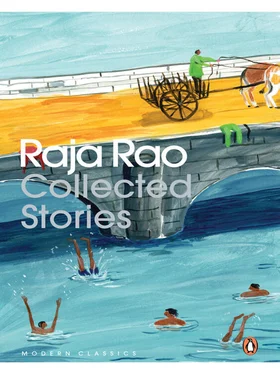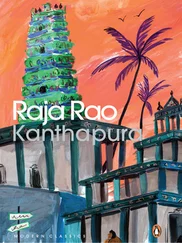Raja Rao - Collected Stories
Здесь есть возможность читать онлайн «Raja Rao - Collected Stories» весь текст электронной книги совершенно бесплатно (целиком полную версию без сокращений). В некоторых случаях можно слушать аудио, скачать через торрент в формате fb2 и присутствует краткое содержание. Год выпуска: 2014, Издательство: Penguin, Жанр: Классическая проза, на английском языке. Описание произведения, (предисловие) а так же отзывы посетителей доступны на портале библиотеки ЛибКат.
- Название:Collected Stories
- Автор:
- Издательство:Penguin
- Жанр:
- Год:2014
- ISBN:нет данных
- Рейтинг книги:5 / 5. Голосов: 1
-
Избранное:Добавить в избранное
- Отзывы:
-
Ваша оценка:
- 100
- 1
- 2
- 3
- 4
- 5
Collected Stories: краткое содержание, описание и аннотация
Предлагаем к чтению аннотацию, описание, краткое содержание или предисловие (зависит от того, что написал сам автор книги «Collected Stories»). Если вы не нашли необходимую информацию о книге — напишите в комментариях, мы постараемся отыскать её.
Collected Stories — читать онлайн бесплатно полную книгу (весь текст) целиком
Ниже представлен текст книги, разбитый по страницам. Система сохранения места последней прочитанной страницы, позволяет с удобством читать онлайн бесплатно книгу «Collected Stories», без необходимости каждый раз заново искать на чём Вы остановились. Поставьте закладку, и сможете в любой момент перейти на страницу, на которой закончили чтение.
Интервал:
Закладка:
Shivlal, the last boy, was interested neither in the English language nor in the ginning mills. While living with his brother — the same who was a cook to the Dholpur Stationmaster — a Sadhu came in unobserved and sat on the railway station bench. ‘Fetch me some water, I’m thirsty,’ he said. The boy ran to the stationmaster’s quarters (a squat house under the neem tree, there) and brought the Sadhu a glass of water. Meanwhile the stationmaster had warned the Sadhu: ‘Please leave the premises of the station, you hear. You cannot take the train. But if you do — I’ll have you arrested.’ The Sadhu laughed: ‘Oho,’ he said, ‘try, and we’ll see.’ The stationmaster meant what he said. Those were Government rules, and the trains belong to the Government. But there was no policeman in eight miles circle. Anyway there was no need for a policeman either. The Sadhu just disappeared. The train came, stopped, emptied somewhat, and filled in with a few new passengers, and whistled — it was the Itarsi Express — but there was no Sadhu. At the time the train was just getting into motion, suddenly from the other side of the track, the Sadhu jumped on the running footboard. The guard showed the red flag. The train stopped and the Sadhu ran Kamandala and topknot, across the fields, before they could find him. Shivlal was in tears. He loved the Sadhu. He loved the Sadhu’s matted hair, and the marvels he told of his travels. Shivlal had even fed the Sadhu, at home, when the stationmaster was on duty and tied up at the station. The stationmaster was a young widower. His wife had just died. He had not married again.
The next morning something extraordinary was seen at Dholpur railway station. And people there remember it to our own day. When the Nagpur Express dragged in, one saw a Sadhu stretched on the farther track, with nails struck through his two feet and left hand, dead-down to the earth. Laughing, he was caressing his long beard, with the other hand. There was such a commotion, passengers rushed down, and some even fell at the Sadhu’s feet, women fainted. But he was laughing away at the crowd, at the train, and at young Shivlal who was in tears. ‘And now,’ said the Sadhu, ‘make your train move. That wretched thing is nailed to this station as I’m nailed to this earth. Isn’t that so, child?’ he asked, looking at Shivlal. Shivlal would say nothing. He was sobbing. The passengers prayed: ‘Let me pay you the fare, Swamiji.’ ‘O come with me Swamiji, and be my guest?’ ‘O Swamiji bless me, I’m an unhappy man. I have lost all my family in the recent Mahanadi floods.’ The Sadhu heard no one. The guard blew the whistle. The crowd ran to the train. The train whistled, and despite the Sadhu it started to move. The Sadhu swore. ‘You bitch,’ he shouted, ‘you move. I ask you: stop!’ And Shivlal will still tell you at Dholpur station, the train stopped just after a few puffs like a kickedin-the-shins cur. The driver, an Anglo-Indian, furnished and refurnished the engine with coal, pulled this plug and that: Chuk, chuk, chuk, it would puff, but it would not budge. And the whole valley could hear the Sadhu’s laughter. Even more people jumped out of the train, and fell at his feet, ‘O great man may you bless us!’ ‘O great man let me have a child.’ ‘O great man,’ said Ramlal, the stationmaster’s cook running from the stationmaster’s quarters. ‘May my brother win the high court case against that wretch, my uncle.’ This was before Ramlal had left for Bombay. The stationmaster himself came down with the guard. The guard said: ‘Sadhuji you could go to the end of the world as far as the Western Railways are concerned. But please allow us to go.’ The Sadhu laughing, pulled off his nails as you would the firewood from the burning oven. The driver now whistled. And the Sadhu, his clothes, his trident, and his kamandala, slowly went as if in a saunter, towards the train. Many doors opened. Shivlal followed him. ‘Jump in, child,’ said the Sadhu. Shivlal jumped in, like his dog. And the Sadhu entered the compartment and all the passengers gave way and made a place for him, to sit. Some brought out a pillow, and others carpets, and a few lit incense sticks. Some offered him bananas. Shivlal was so proud. The Sadhu took the fruits and gave them to Shivlal.
‘Where do you go, Sadhuji?’
‘I go nowhere.’
‘But you must go somewhere?’
‘All somewheres go to one where.’
‘But,’ said a clever passenger, ‘that somewhere must be some sanctuary, some spot, some riverside holy city.’
‘There’s only one place such appointed — which is no, no place.’
‘Benares,’ said a pandit, his fingers trembling with old age.
‘The city of Kala Bhairav is no place, for everything is destroyed there as it arises. So I go where there is instant destruction; therefore all is. Where Shivji danced on the crematorium is where the world is real. Time and space are burnt to ashes. To live, you must dance,’ said the Sadhu and gyrated in the corridor of the wagon and in such a manner that the passengers (and Shivlal too) thought he would just jump out, and fly away.
‘Shiv,’ he said, ‘fill me now, my hookah.’ And Shivlal put the tobacco and pushed it deep in, and when the train stopped, some passengers brought coal embers from the railway engine, and laid them on the tobacco.
‘Ah,’ said he to Shiv, ‘you’re a worthy devotee to a Sadhu.’ And Shiv loved the Sadhu so much, especially the smell of the hookah.
The story is long. But the end is simple. Shiv and the Sadhu after many wanderings came to Benares. Shiv soon discovered that the Sadhu was no easy person to serve. ‘Oh, fill the hookah, get me a soda water bottle. Hé, go and find me three ripe mangoes, and then get me some milk. You say it’s for Sadhu Satyadevji. Who does not know Sadhu Satyadevji?’ Shiv discovered the Sadhu lost his temper easily, and when he did, he almost grew red-hot like an iron blowpipe fallen into the kitchen fire. The Sadhu also did not mind pilfering here and there, and if found out, he used such foul language: ‘Son of a prostitute, I’ll sleep with your mother.’ And he’d threaten people with all and evil things. One day in Benares (after they had been some fifteen days on the Ganga ghats) Shiv was wandering aimless through the streets. He was in tears. The Sadhu had howled at him (the Sadhu had had no bhang for three days — nobody had brought it to him).
True Shiv was negligent in performing his daily, dedicated duties. But he was a landowner’s son. And at the thought of Vallabhpur and the tiger cubs running through the moonlit streets, he bursts into sobs, A woman bejewelled, with much pan-red on her lips, and with temple offerings in her hands, and a gay gait, befriended him. ‘Son, why do you weep?’
‘I’m an orphan,’ answered Shiv, ‘and I am homeless.’
‘Come and I’ll feed you. And you can stay with me,’ said she. And she took him to a grand three-storeyed house and on to the second floor; when the woman came in Shiv saw there were lots of men in the apartment, musical instruments lying carelessly about the place. They all smiled and bowed to her, and some started tuning the instruments to play their music. There was also an old woman, tired, and with a husky voice. ‘Mother, I’ve found this orphan. I liked his face. We’ll keep him.’
‘Well, you’ve had enough boys here. They never brought you anything, but misery. And why do you want one more hooker.’
‘Mother, I liked this boy. I think he’ll bring in luck.’
From that day onwards Shivlal stayed in that house and started on his new job. When foppish men come to the door downstairs, he must lead them in. Then disappear. And in a few days Shivlal could go anywhere in Benares, and when he found the proper men — he knew them almost by a second instinct— he would say: ‘Maharaj, I know just the place for you.’ ‘O, go away you heady bloke.’ ‘No Maharaj,’ he would insist, ‘it’s not far from here. And she is so ripe. And full. And the music so good.’ The more the man threatened the more he wanted to go there —this Shivlal, by now, knew. So Shiv would sometimes play pranks with the future customer and say: ‘O you are searching for the Rukmini Temple or you want to buy a mynah and the cage,’ and the man would smile back and say, ‘I’ll skin you, do you hear. Go away.’ But whether you want neither, a caged mynah nor the Rukmini Temple, you still come to Gowalia Lane. The Benares concubines are famous through history. How come to Kashi Vishwanath and not taste of the honey of consecrated womanhood? ‘Lord, may she be handsome, and may she know lovemaking of such a wise, the earth knows no greater truth. Lord, the woman is the most beautiful thing you have created. The breasts and the waist, and the music that rises, curls, and falls — and her dance is the dance that the Lord Shiva himself initiated mankind into. Takkadhim Takkkakakaka dhim, ta dhim — and she dances. Look.’
Читать дальшеИнтервал:
Закладка:
Похожие книги на «Collected Stories»
Представляем Вашему вниманию похожие книги на «Collected Stories» списком для выбора. Мы отобрали схожую по названию и смыслу литературу в надежде предоставить читателям больше вариантов отыскать новые, интересные, ещё непрочитанные произведения.
Обсуждение, отзывы о книге «Collected Stories» и просто собственные мнения читателей. Оставьте ваши комментарии, напишите, что Вы думаете о произведении, его смысле или главных героях. Укажите что конкретно понравилось, а что нет, и почему Вы так считаете.












